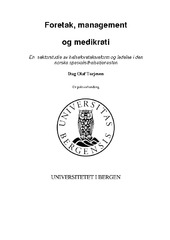| dc.contributor.author | Torjesen, Dag Olaf | eng |
| dc.date.accessioned | 2008-10-23T11:08:07Z | |
| dc.date.available | 2008-10-23T11:08:07Z | |
| dc.date.issued | 2008-02-15 | eng |
| dc.identifier.isbn | 978-82-308-0504-6 (print version) | |
| dc.identifier.uri | https://hdl.handle.net/1956/2824 | |
| dc.description.abstract | This thesis consists of four articles that deal with the introduction of unitary management from2000 and health enterprise reform from 2002 in Norwegian specialist health care (hospitals).The first of the articles (”Knowledge, professions and management. Knowledge perspectiveson management in Norwegian healthcare”) focuses on the historical traditions and formationsof the old collegiate management structure in Norwegian hospitals and how these collegiateforms were founded on the medical profession’s extensive autonomy, bio-medical knowledgeand health planning. The article also examines how Norwegian nurses in the post-Second Warperiod adopted knowledge from the field of general management in US universities, and howthis knowledge adopted by the nursing profession is an early indication of how the nurse adoptto the present professional management regime in Norwegian health enterprises. This also gavenurses access to management positions and legitimacy as managers within this regime.The second article ( ”State ownership and enterprises, new conditions for management inNorwegian hospitals”) studies the question of whether hospital managers have gained moreautonomy after the introduction of the health enterprise reform. Even though Norwegianauthorities have invested a great deal of effort in reforming hospitals into autonomousenterprises by means of empowered general management, medical management and theprofessional logic still have a strong standing in hospitals. If general management has becomemore important in Norwegian hospitals, this is in the administrative top management, where ithas become centralised and empowered according to an economic logic. Most of the managersin the reformed Norwegian hospitals are still managing in accordance with a professional,medical logic. The exception is nurses who hold new management positions. Nurses areadapting through more involvement in and commitment to the new managerial expectations,more so than the physicians who more or less are ignoring the managerial reform attempts.The third article (”Management between autonomy and transparency”) investigates how therecent Norwegian hospital reform can be seen as a vehicle to transform the mode of managinga hospital. The traditional collegiate form of management characterizing Norwegian hospitalshas been challenged by deliberate efforts to implement general management, including theprinciple of unity of command. A simultaneous development, however, has been efforts atincreasing transparency, giving the public better information about the costs and quality of thehospitals. This article sets out to show how an executive group of hospital managers dealt withthese new organizational constraints. In accordance with the reform ideology, the managersunanimously accepted performance unit accountability, unity of command, and the distinctionbetween professional and general management. However, they also pointed out dissonancebetween their assumed accountability and their lack of power. To resolve this paradox, they cleverly set out to exploit the financial incentive system to increase revenues. This was revealedby investigative reporters taking advantage of publicly accessible databases concerning theoperations performed in hospitals.The fourth article (”Hospital managers’ perceptions of the conditions of management inDenmark and Norway”) compares hospital managers’ perceptions of their managementcontext in Denmark and Norway. Survey data from recent Danish and Norwegian studies areused to compare and contrast the two countries particularly in regard to four themes: 1)perceptions of the hospital’s relation to its environment, 2) perceptions of staff motivation, 3)perceptions of stimuluses for change, and 4) value orientations. The main purposes of thearticle are, thus: 1) to investigate variation in perceptions of management conditions in twocountries that may appear very alike in cultural terms; 2) based on this, to investigate the impactof the Norwegian hospital management reform in 2002; and finally 3) to develop more generalstatements about hospital management based on data from the two countries. | en_US |
| dc.language.iso | nob | eng |
| dc.publisher | The University of Bergen | eng |
| dc.relation.haspart | Paper I: Tidsskrift for Samfunnsforskning 48(2), Torjesen, D. O., Kunnskap, profesjoner og ledelse. Kunnskapsperspektiver på ledelse i norsk helsetjeneste, pp. 275-290. Copyright 2007 Universitetsforlaget. Reproduced with permission. Accepted version. | eng |
| dc.relation.haspart | Paper II: Torjesen, D. O, 2008, Statlig eierskap og foretaksmodell, nye rammebetingelser for ledelse i norske sykehus. Draft. | eng |
| dc.relation.haspart | Paper III: Nordiske Organisasjonsstudier 7(2), Gammelsæter, H.; Torjesen, D. O., Ledelse mellom autonomi og innsyn i helseforetaket, pp. 77-94. Copyright 2005 Fagbokforlaget. Reproduced with permission. Accepted version. | eng |
| dc.relation.haspart | Paper IV: Nordiske Organisasjonsstudier 7(2), Vrangbæk, K.; Torjesen, D. O., Sygehuslederes opfattelse af ledelsesvilkår i Danmark og Norge, pp. 37-57. Copyright 2005 Fagbokforlaget. Reproduced with permission. Accepted version. | eng |
| dc.title | Foretak, management og medikrati. En sektorstudie av helseforetaksreform og ledelse i spesialisthelsetjenesten | nob |
| dc.type | Doctoral thesis | en_US |
| dc.rights.holder | Copyright Dag Olaf Torjesen | en_US |
| dc.subject.nsi | VDP::Samfunnsvitenskap: 200::Statsvitenskap og organisasjonsteori: 240::Offentlig og privat administrasjon: 242 | nob |
